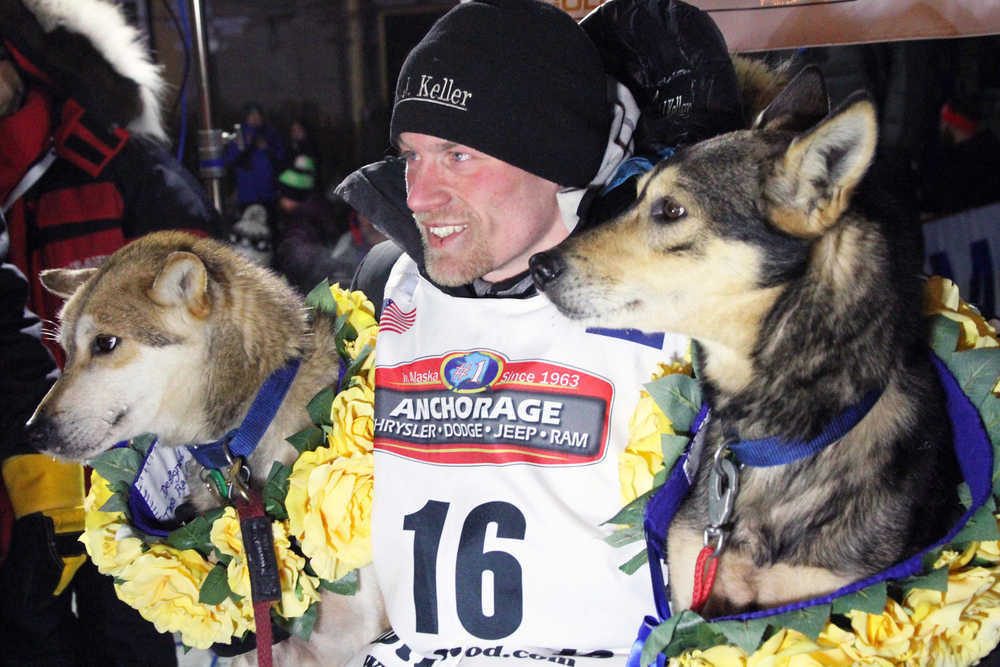NOME, Alaska — Dallas Seavey did more with less this year at the Iditarod Trail Sled Dog Race.
He set a record pace early Tuesday morning when he won his third straight Iditarod and fourth race in the last five years. And he did it with just six dogs, after starting the race nearly 1,000 miles across Alaska with 16.
No other musher this year has fewer dogs.
And the record Seavey beat? It was the one he set in 2014, when he brought only seven dogs into Nome.
“The key is always to run the dogs you have, on the trail you have, the best way you can moving forward,” Seavey said.
This year a virus hit two of his dogs hard, and he said it was apparent on the first day of the race he’d have to drop them. One, a dog named Hero who led him to Nome last year, hurt the most, he said.
Worry set in when he lost two more dogs.
“Then you try to formulate a plan using those elements that might be able to get you to Nome quickly,” he said. “It was a concern, but not a showstopper.”
Seavey completed the nearly 1,000-mile race in a record time of 8 days, 11 hours, 20 minutes, 16 seconds. He arrived in Nome at 2:20 a.m.
He said at the finish that he spent the first two-thirds of the race “dead on my feet” and had never been so tired.
“This was a heck of a trip, all the way from the start. It was up and down,” said Seavey, who picked up $75,000 and a new pickup for winning the race.
The Iditarod started March 6 in Willow, about 50 miles north of Anchorage, and took mushers across two mountain ranges, down the mighty Yukon River and along the wind-scoured Bering Sea coast.
Eighty-five mushers began the race, but 12 have so far scratched, including four-time champion Lance Mackey. He dropped out Monday, citing personal health concerns.
Seavey’s record time beat his previous record set in 2014 of 8 days, 13 hours, 4 minutes, 19 seconds. His only loss during the past five years was to his father, Mitch Seavey, who won in 2013.
Mitch Seavey took second place in this year’s race, coming in just after his son early Tuesday morning.
The Seaveys are close, but also competitive.
“Win or lose the race or not doesn’t change the fundamentals of our relationship — that as family and friends,” Mitch Seavey said, reiterating how proud he is of his son’s accomplishments.
“It’s an interesting dynamic to be the biggest competitors and best friends at the same time,” he said.
Dallas Seavey said his record breaking run had to have three elements, a phenomenal dog team, a very good trail and the final element was a nod to his father.
“It requires stiff competition. Without that competition, you’re not going to push the team that will allow them to break the record,” he said. If his father wasn’t within minutes of his team, he said he wouldn’t have urged them along as hard as he did.
The 2016 Iditarod will partly be remembered for an attack on two mushers on the trail near the checkpoint in Nulato.
Arnold Demoski is accused of intentionally driving a snowmobile into musher Aliy Zirkle’s team and then the team of four-time Iditarod champion Jeff King.
One of King’s dogs was killed, and at least two other dogs were injured.
Zirkle finished in third place Tuesday morning, and King was running in 10th place.
Demoski has said he was returning home from a night of drinking when he struck the teams. He was charged with assault, reckless endangerment and reckless driving.
Demoski’s attorney, Bill Satterberg, declined comment to The Associated Press on Monday.

